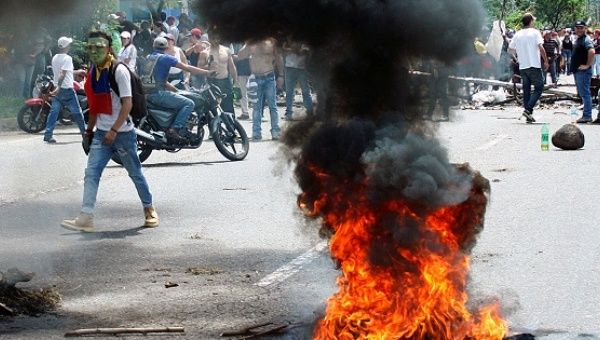Alwaght- The US has spent at least $49 million since 2009 to support right-wing opposition forces in Venezuela who are now in their seventh week of violent protests to oust democratically-elected President Nicolas Maduro.
According to the 2010 budget justification, which designated $6 million that year to Venezuela's “Economic Support Fund" the budget “will support efforts to preserve and expand democratic space through programs that strengthen and promote civil society, citizen participation, independent media, human rights organizations, and democratic political parties.”
In a more detailed breakdown of the 2011 $5 million budgeted for Venezuelan economic support, the budget indicates that $1 million was designated specifically for the support of “political competition and consensus building.”
Throughout its budget justifications for Venezuela, the department of state repeatedly emphasizes its concern over the “increasingly authoritarian tendencies” of the governments of the late President Hugo Chavez, and current President Nicolas Maduro, in spite of regularly scheduled elections that are internationally recognized.
Since the beginning of Venezuela's Bolivarian Revolution, with the democratic election of former president Hugo Chavez in 1998, the oil-rich nation has been repeatedly attacked as "undemocratic." President Maduro has reiterated that elections will be held on schedule in 2018, but the opposition has demanded his immediate removal, seeking foreign intervention in its destabilization campaign.
The revolutionary government has significantly eroded the political and economic hegemony the US had over Venezuelan oil, which holds one of the largest petroleum reserves in the world. Prior to the election of Chavez, in spite of its vast resource wealth, Venezuela was plagued by sharp class inequalities.
ExxonMobil Factor in Venezuela unrest
The US administration of Donald Trump has publicized its policy of pursuing regime change in Venezuela.
Speaking in January before his confirmation, US Secretary of State Rex Tillerson declared that he would “urge close cooperation with our friends in the hemisphere, particularly Venezuela’s neighbors Brazil and Colombia to seek a negotiated transition to democratic rule in Venezuela.” The so-called ‘transition to democracy’ is the disguise being used to carry a civilian coup in Venezuela through street protests. Tillerson, a former executive in ExxonMobil claimed that the economic crisis in the oil-rich South American country was “largely a product of its incompetent and dysfunctional government, first under Hugo Chavez, and now under his designated successor, Nicolas Maduro.”
In 2007, late President Chavez ordered the nationalization of 22 major multinational corporations operating in the country including ExxonMobil, then headed by Tillerson who now appears to be on a revenge mission against the revolutionary Venezuelan government.
According to a 2007 US strategic document leaked by former CIA-whistleblower Edward Snowden in 2013, Venezuela was seen as the main adversary of the United States in the Western Hemisphere. The country was listed as one of the top six enduring targets for the top US spy agency, NSA, along with China, North Korea, Iraq, Iran and Russia.



























